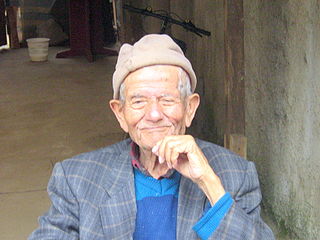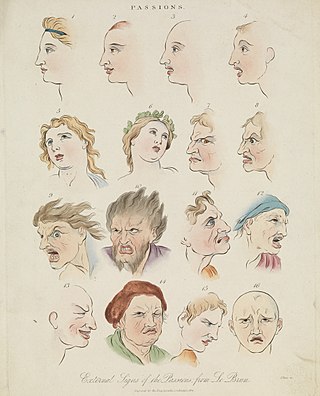Related Research Articles
Hedonism is a family of philosophical views that prioritize pleasure. Psychological hedonism is the theory that the underlying motivation of all human behavior is to maximize pleasure and avoid pain. As a form of egoism, it suggests that people only help others if they expect a personal benefit. Axiological hedonism is the view that pleasure is the sole source of intrinsic value. It asserts that other things, like knowledge and money, only have value insofar as they produce pleasure and reduce pain. This view divides into quantitative hedonism, which only considers the intensity and duration of pleasures, and qualitative hedonism, which holds that the value of pleasures also depends on their quality. The closely related position of prudential hedonism states that pleasure and pain are the only factors of well-being. Ethical hedonism applies axiological hedonism to morality, arguing that people have a moral obligation to pursue pleasure and avoid pain. Utilitarian versions assert that the goal is to increase overall happiness for everyone, whereas egoistic versions state that each person should only pursue their own pleasure. Outside the academic context, hedonism is a pejorative term for an egoistic lifestyle seeking short-term gratification.
Psychosomatic medicine is an interdisciplinary medical field exploring the relationships among social, psychological, behavioral factors on bodily processes and quality of life in humans and animals.

Happiness is a complex and multifaceted emotion that encompasses a range of positive feelings, from contentment to intense joy. It is often associated with positive life experiences, such as achieving goals, spending time with loved ones, or engaging in enjoyable activities. However, happiness can also arise spontaneously, without any apparent external cause.

Schadenfreude is the experience of pleasure, joy, or self-satisfaction that comes from learning of or witnessing the troubles, failures, pain, suffering, or humiliation of another. It is a loanword from German. Schadenfreude has been detected in children as young as 24 months and may be an important social emotion establishing "inequity aversion".
Positive psychology is a field of psychological theory and research of optimal human functioning of people, groups, and institutions. It studies "positive subjective experience, positive individual traits, and positive institutions... it aims to improve quality of life."

Martin Elias Peter Seligman is an American psychologist, educator, and author of self-help books. Seligman is a strong promoter within the scientific community of his theories of well-being and positive psychology. His theory of learned helplessness is popular among scientific and clinical psychologists. A Review of General Psychology survey, published in 2002, ranked Seligman as the 31st most cited psychologist of the 20th century.
Tara Brach is an American psychologist, author, and proponent of Buddhist meditation. She is a guiding teacher and founder of the Insight Meditation Community of Washington, D.C. (IMCW). Brach also teaches about Buddhist meditation at centers for meditation and yoga in the United States and Europe, including Spirit Rock Meditation Center in Woodacre, California; the Kripalu Center; and the Omega Institute for Holistic Studies.
Anodea Judith is an American author, therapist, and public speaker on the chakra system, bodymind, somatic therapy, and yoga. Judith is the author of Wheels of Life: A User's Guide to the Chakra System. She has maintained a private practice for over twenty years and presents workshops nationally and internationally at holistic retreat centers, yoga studios, Neo-Pagan and New Age events and training institutes. She is a past president of the Church of All Worlds (1986–1993), a founder of Lifeways, a school for the study of the healing and magical arts (1983), and a founding member of Forever Forests. She is on the faculty of Kripalu Center for Yoga and Health, and she is the founder and director of Sacred Centers, a teaching organization focusing on Chakra studies. She has a son named Alex, and one of her brothers is actor and singer-songwriter Martin Mull.
Bernie Siegel is an American writer and retired pediatric surgeon, who writes on the relationship between the patient and the healing process. He is known for his best-selling book Love, Medicine and Miracles.

Buddhism includes an analysis of human psychology, emotion, cognition, behavior and motivation along with therapeutic practices. Buddhist psychology is embedded within the greater Buddhist ethical and philosophical system, and its psychological terminology is colored by ethical overtones. Buddhist psychology has two therapeutic goals: the healthy and virtuous life of a householder and the ultimate goal of nirvana, the total cessation of dissatisfaction and suffering (dukkha).
Dan B. Allender is an American Christian therapist, author, and professor focusing on sexual abuse and trauma recovery, as well as story, marriage and family, and Christian Sabbath. Allender received his Master of Divinity from Westminster Theological Seminary and his PhD in Counseling Psychology from Michigan State University. He has taught at Grace Theological Seminary (1983-1989), Colorado Christian University (1989-1997), and The Seattle School of Theology and Psychology.

Emotion classification, the means by which one may distinguish or contrast one emotion from another, is a contested issue in emotion research and in affective science. Researchers have approached the classification of emotions from one of two fundamental viewpoints:
- that emotions are discrete and fundamentally different constructs
- that emotions can be characterized on a dimensional basis in groupings

Well-being is what is ultimately good for a person. Also called prudential value and welfare, it is a measure of how good a person's life is going for them, both in a positive and a negative sense. In its positive sense, well-being is sometimes contrasted with ill-being as its opposite. The term "subjective well-being" denotes how people experience and evaluate their lives, usually measured in relation to self-reported well-being obtained through questionnaires.

Awe is an emotion comparable to wonder but less joyous. On Robert Plutchik's wheel of emotions awe is modeled as a combination of surprise and fear.

The Psychology of Self-Esteem is a book by Nathaniel Branden, first published in 1969. It explains Branden's theories of human psychology, focusing on the role of self-esteem. Most of the book was written during Branden's association with Ayn Rand, and it reflects some of her philosophical ideas. The book's success helped to popularize the idea of self-esteem as an important element of self-improvement.
Everett L. Worthington Jr. is a licensed clinical psychologist and Professor of Psychology at Virginia Commonwealth University (VCU). His research interests include forgiveness and other virtues, religion and spirituality in clinical practice, and the hope-focused approach to counseling couples. He has written over 30 books on topics including forgiveness of others, self-forgiveness, character strength, religion and psychology, and couples' therapy, and he has published over 350 scholarly articles and chapters. Worthington has been frequently cited as an expert on his topics of interest in the scientific literature and public media.
Diana Foșha is a Romanian-American psychologist, known for developing accelerated experiential dynamic psychotherapy (AEDP), and for her work on the psychotherapy of adults suffering the effects of childhood attachment trauma and abuse.
Nischala Joy Devi is a published author and teacher of yoga.

Robin Stern is an American psychoanalyst at Yale University, associate director for the Yale Center for Emotional Intelligence, an associate research scientist at the Yale Child Study Center, and is on the faculty of Teachers College, Columbia University.
Susan Heitler is an American clinical psychologist. She practiced from 1975 to 2020 at the Rose Medical Center in Denver, treating individuals, couples and families. She specializes in treating depression, anger, anxiety, marital problems, parental alienation, and conflict resolution.
References
- 1 2 Cowan, Thomas (2016). Human Heart, Cosmic Heart: A Doctor's Quest to Understand, Treat, and Prevent Cardiovascular Disease. White River Junction, VT: Chelsea Green Publishing. p. 111. ISBN 9781603586191.
- ↑ About Official page
- 1 2 Epstein, William (2017). The Masses are the Ruling Classes: Policy Romanticism, Democratic Populism, and Social Welfare in America. Oxford: Oxford University Press. p. 99. ISBN 9780190467067.
- ↑ Robertson, Robin; Combs, Allan (2014-07-10). Chaos theory in Psychology and the Life Sciences. Psychology Press. ISBN 9781317780076.
- ↑ Official page
- ↑ Books by Paul Pearsall Publishers Weekly
- ↑ American Psychological Association
- ↑ The Beethoven Factor books.google.com
- ↑ The Heart's Code amazon.com
